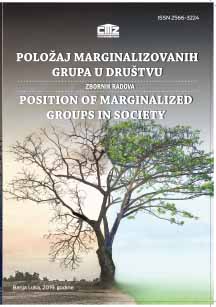НЕВРАБОТЕНОСТА, СОЦИЈАЛНАТА ИСКЛУЧЕНОСТ И ОПШТЕСТВЕНАТА МАРГИНАЛИЗАЦИЈА
Unemployment,social exclusion and social marginalization
Author(s): Dragan StefanovskiSubject(s): Politics / Political Sciences, Social Sciences, Civil Society, Sociology, Social development, Social differentiation, Social Norms / Social Control, Sociology of Politics
Published by: CENTAR MODERNIH ZNANJA
Keywords: urban poverty; social marginalization; culture of poverty; urban society
Summary/Abstract: Modern social tendencies in the postmodern society offer a range of values for global society and urban culture. The integration of global cultural values is primarily the affirmation of material values. For an extremely long time, it was thought that the problem of poverty was faced by someone else, far away from us and our surroundings. But over the past decade, we are talking continuously about the problem of poverty, detected in almost all countries, a problem that knows no borders and often is spilling over from one state to another. Long-term unemployment is one of the main factors for its occurrence. On the other hand, social stratification under the influence of the process of globalization receives additional ascension in urban society. The deprivation of the poor and their marginalization is recognizable in the lack of equal opportunities for achieving the desired values. The process of marginalization is involved in the lives of the poor population from the earliest age, and is becoming a constant social state recognizable in every segment of social life, and above all in education, labor market, health, culture. Urban space represents a “puzzle” that depicts members of various social groups. Poor neighborhoods produce a culture of poverty. The paper focuses on researching the situation of marginalized groups in the urban environment, in particular the city of Skopje, in terms of the measures taken in fighting against poverty and marginalization of the most vulnerable groups. More and more marginalized are facing the problem of inaccessibility to sources, which are the key to solving their existential needs.
Journal: DRUŠTVENE DEVIJACIJE
- Issue Year: IV/2019
- Issue No: 4
- Page Range: 152-159
- Page Count: 8
- Language: Macedonian

